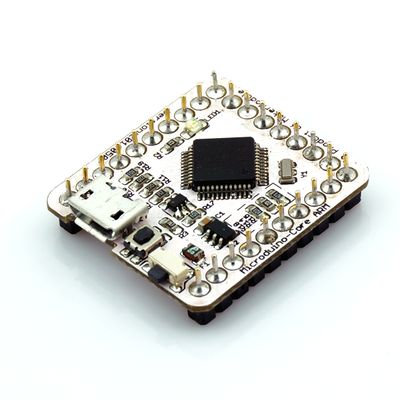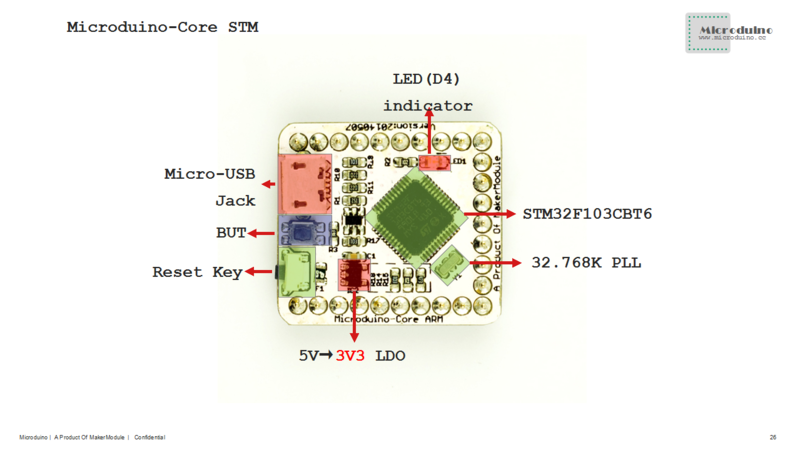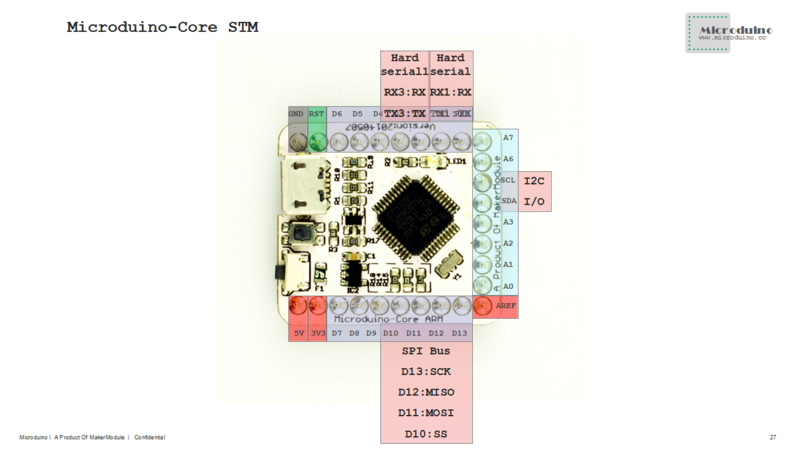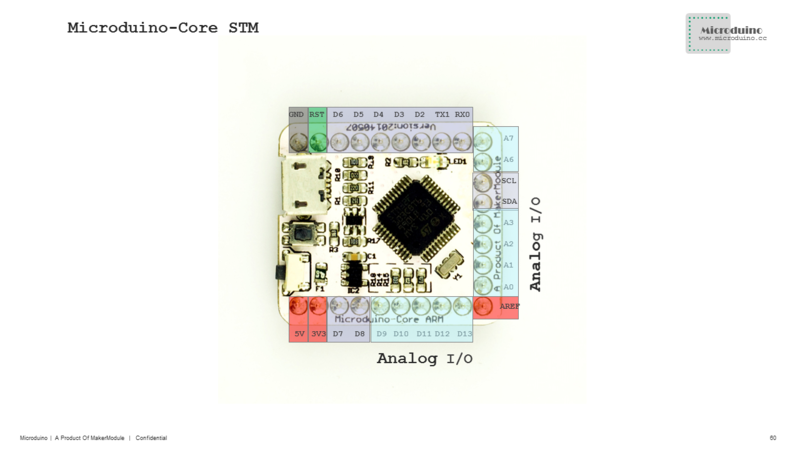Difference between revisions of "Microduino-Module CoreSTM32"
From Microduino Wiki
(→Features) |
(→Specifications) |
||
| Line 19: | Line 19: | ||
| | | | ||
| − | == | + | ==Specification== |
| − | * Microcontroller: STM32F103CBT6 | + | ===Electrical Specification=== |
| − | * | + | *Microcontroller: STM32F103CBT6 |
| − | * | + | *Frequency: 72MHz |
| − | * Core | + | *Operation voltage: 5V |
| − | * | + | *Core voltage: 3.3V |
| − | * | + | *Flash:128KB |
| − | * Digital I/O | + | * SRAM:20KB |
| − | * Analog | + | ===Pin Specification === |
| − | * | + | *Digital I/O pin: |
| − | * | + | 0,1,2,3,4,5,6,7,8,9,10,11,12,13,14(A0),15(A1),16(A2),17(A3),18(SDA),19(SCL),20(A6),21(A7) |
| − | * Serial | + | *Analog input pin: |
| − | * | + | A0(ADC12_IN0),A1(ADC12_IN1),A2(ADC12_IN2),A3(ADC12_IN3),10(ADC12_IN4),13(ADC12_IN5),12(ADC12_IN6),11(ADC12_IN7),A6(ADC12_IN8),A7(ADC12_IN9) |
| − | * | + | *Serial port: |
| − | + | **Serial RX0 and TX1, used for receiving(RX) and sending(TX) TTL serial data. | |
| − | * | + | **Serial1 D2(RX3)and D3(TX3), used for receiving(RX) and sending(TX) TTL serial data. |
| + | * Hardware PWM: 0,1,4,11,12,14(A0),15(A1),16(A2),17(A3),18(SDA),19(SCL),20(A6),21(A7) | ||
| + | * SPI:D10(SPI1_NSS)、D11(SPI1_MOSI)、D12(SPI1_MISO)、D13(SPI1_SCK); | ||
| + | *IIC:18(SDA)、19(SCL) ; | ||
| + | *Each I/O port has interruption function. | ||
| + | |||
| + | :[[file:Microduino-Core STM-PinoutBig.png|800px|thumb|center|Microduino-Core STM-Pinout]] | ||
| + | :[[file:Microduino-Core STM-Pinout1Big.png|800px|thumb|center|Microduino-Core STM-Pinout]] | ||
| + | :[[file:Microduino-Core STM-Pinout2Big.png|800px|thumb|center|Microduino-Core STM-Pinout]] | ||
==Documents== | ==Documents== | ||
Revision as of 02:25, 17 December 2015
| Language: | English • 中文 |
|---|
|
Microduino-CoreSTM32 is one of core modules of Microduino series, Microduino-CoreSTM32 is an open source hardware and Maple Mini compatible. It is an 32-bit ARM Cortex-M3 development board, based on STMicroelectronics' STM32F103CBT6 chip. It can be combined with other Microduino modules and used in more projects. ContentsFeatures
|
SpecificationElectrical Specification
Pin Specification
0,1,2,3,4,5,6,7,8,9,10,11,12,13,14(A0),15(A1),16(A2),17(A3),18(SDA),19(SCL),20(A6),21(A7)
A0(ADC12_IN0),A1(ADC12_IN1),A2(ADC12_IN2),A3(ADC12_IN3),10(ADC12_IN4),13(ADC12_IN5),12(ADC12_IN6),11(ADC12_IN7),A6(ADC12_IN8),A7(ADC12_IN9)
DocumentsMicroduino- CoreSTM32 used components.
DevelopmentSet up the Microduino-CoreSTM32 development environment
Program for Microduino-CoreSTM32
The beginning of Micoduino-CoreSTM32 Burn the Microduino- CoreSTM32 BootLoader
ApplicaionHistoryPicture |



